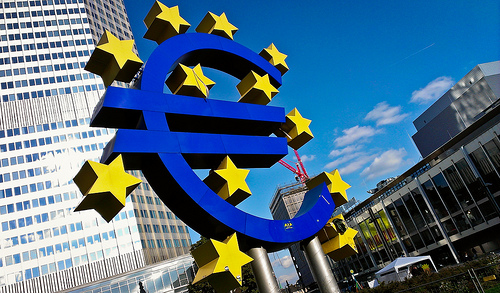Although Twitter’s (NYSE: TWTR) blockbuster IPO dominated the headlines Thursday, the surprise rate cut from the European Central Bank was having a bigger impact on global markets.
Global stocks were mostly lower after the rate cut, while U.S. Treasury yields also fell and the euro weakened against the U.S. dollar.
The ECB lowered the refi rate by a quarter point to 0.25%, a record low. The central bank slashed the rate after the Eurozone annual inflation rate fell to 0.7%, the lowest since early 2010 and below the ECB’s target rate.
“I’m still bullish on European equities and the ECB rate cut doesn’t really change that thesis,” said Charles Sizemore, chief investment officer of Sizemore Capital. He said he’s heavily invested in Europe in the Sizemore Global Macro portfolio, which he manages on Covestor’s platform.
“If anything, the ECB rate cut could cause the euro to fall relative to the dollar and other world currencies, which isn’t a bad thing because it could help European exporters,” Sizemore added.
One reason he’s favoring Europe right now in the Global Macro portfolio is that the region is “significantly cheaper” than the U.S.
“The U.S. isn’t in a bubble by any stretch, but stocks here are pretty close to fairly valued and not as attractive as recent years,” Sizemore said. He thinks Europe is 20% to 30% cheaper than the U.S. depending on which market and valuation metrics are used.
“Eurozone companies were hit by a deep recession and the debt crisis, but the outlook is improving,” he notes. “On the bright side, they have more emerging market exposure than the U.S., so you can buy European stocks at bargain prices as a play on developing markets.”
Sizemore said the ECB lowered rates because the last thing it wants is a Japan-style economic malaise with prices falling and the economy slowing.
“That’s their nightmare scenario,” he said.
Aging demographics is another issue for Europe and is inherently deflationary as older consumers are not as active with purchases and borrowing, Sizemore pointed out.
“Overall, I remain bullish on Europe,” he adds. “Germany is actually very healthy. I also like that sentiment is still pretty rotten. Institutions are starting to buy, but most individual investors are still very negative on Europe.”
Photo Credit: ChrisGoldNY
Disclaimer: All investments involve risk and various investment strategies will not always be profitable. International investing involves special risks, such as political instability and currency fluctuations. Past performance does not guarantee future results.





